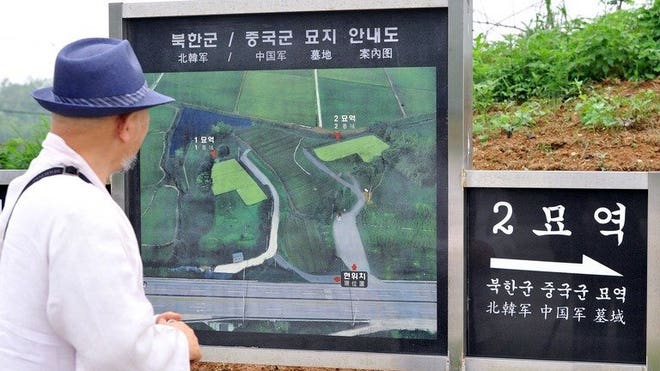Laying bitter memories to rest in a Cold War graveyard

(Fox News) – His actions were criticised in some conservative circles, with questions raised over the monk’s “patriotism” and suggestions that he was somehow lending comfort to the enemy.
Just south of the minefields, fences and watchposts of the world’s last Cold War frontier, a monk pours rice wine on the grave of an unknown North Korean soldier killed 60 years ago.
The monk, 57 year-old Mukgai, is alone in tending to the spirits of “enemy” combatants — North Korean and Chinese troops — who died in the slaughter of the 1950-53 Korean War and whose remains lie buried in an isolated South Korean cemetery.
Every day, he performs the same Buddhist ritual, chanting sutras, banging a drum and pouring the wine in an effort, he says, to soothe the souls of young men permanently exiled in death.
Some 735 North Koreans and 369 Chinese are buried in the cemetery — the only one of its kind in South Korea — located a short walk from the Imjin River that forms part of the border separating the two Koreas.
Mukgai decided to devote himself to tending the graveyard after what he describes as a vivid and disturbing supernatural encounter one night in October 2011 in the grounds of the nearby temple where he lived at the time.
“All of a sudden the temple grounds were packed with the ghosts of all these dead soldiers, making a huge commotion, some of them speaking in Chinese,” he recalled.
They were wearing worn-out or bloodied military uniforms, some of them complaining they were cold and hungry, begging for help and crying that they missed their homes, the monk told AFP.
“It was an unbelievable and unforgettable scene,” he said.
Both moved and frightened by the experience, Mukgai said he initially tried to ignore the pleas, but was worn down by what became nightly visitations in the temple grounds.
When the temple closed, after the land it was on was sold, the monk moved to an adjacent log house and eventually embarked on his mission to bring some comfort to the soldiers’ spirits.
Casualty figures from the Korean War remain disputed, but around 200,000 North Korean troops are believed to have been killed. China entered the war in October 1950 and lost around 135,000 soldiers in the fighting.
July 27 will mark the 60th anniversary of the armistice that ended the conflict but left both sides still technically at war because it was never formalised by a peace treaty.
Beijing and Pyongyang established diplomatic relations in 1992 and China is now South Korea’s largest trade partner.
Relations between North and South Korea on the other hand remain extremely volatile, as witnessed most recently by a surge in military tensions in March and April.
The cemetery was established in 1996 as a final resting place for the remains of North Korean and Chinese soldiers that had been buried in small plots scattered around the country.
Read more at: http://www.foxnews.com/world/2013/07/21/laying-bitter-memories-to-rest-in-cold-war-graveyard/#ixzz2ZjtELzgn

